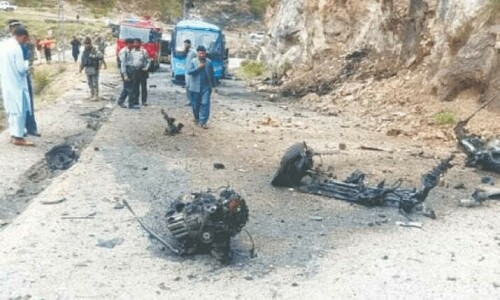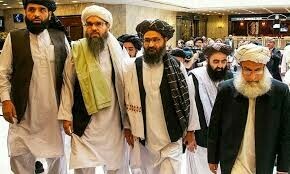WASHINGTON: The United States and Taliban now share a “common purpose” in Afghanistan, according to a top American general.
“We share a common purpose” and “have been useful to work with” each other, Gen Frank McKenzie, head of the US Central Command (Centcom), said at a recent briefing. “As long as we’ve kept that common purpose aligned, they’ve been useful to work with. They’ve cut some of our security concerns down.”
As the Pentagon announced the Saturday evening drone strike that killed two ISIS-K operatives, reporters asked a spokesperson whether the Taliban provided “any intelligence or any support with this drone strike”.
“I’m not going to talk about intelligence matters one way or the other,” said John Kirby, the Pentagon spokesperson.
Gen McKenzie, who as Centcom chief is now responsible for Afghanistan, was more open. He said the US forces and the Taliban had an arrangement in which “we also use the Taliban as a tool to protect us as much as possible”.
The Wall Street Journal, while commenting on this cooperation, noted that 20 years ago, the US invaded Afghanistan to get rid of the Taliban. “Today, American forces, battered by one of the bloodiest attacks of the war, are relying for their own security on that same group whose members they were trying to kill just weeks earlier,” the newspaper added.
The report claimed that fighters of the Taliban’s elite Badri 313 unit “patrol the same Kabul airport parking lot as US Marines, separated by a few coils of razor wire.” Farther away, “Taliban foot soldiers pat down Afghans seeking to enter the (US-controlled) facility.”
The Journal noted that the Taliban’s “key mission around the airport in the final days of the chaotic withdrawal is to hold off Islamic State,” which owned up the attack that killed 13 US troops, 30 Taliban and over 100 other Afghans in a suicide bombing on Thursday.
The Taliban are “providing the outer security cordon” for American forces, Gen McKenzie explained this arrangement, adding that they had closed some roads at US request, extending the checkpoints’ perimeter.
The New York Times pointed out that two decades ago, President George Bush denounced the Taliban for “aiding and abetting murder” after the attacks of Sept 11, 2001.
“Now, as President Biden ends the war Mr Bush started, the United States is locked in an uneasy partnership with that very enemy force, relying on the Taliban to help safeguard American citizens and their Afghan allies as they race to evacuate the country,” the newspaper commented.
A report by the Bloomberg news agency noted that after fighting each other for 20 years, the US and Taliban “are suddenly finding their interests aligned against a common enemy”.
The report includes a quote by US President Joe Biden, saying that it’s “in the interest of the Taliban that in fact ISIS-K does not metastasise beyond what it is”.
When asked how the US could depend on a long-time adversary for support, Mr Biden said: “It’s not a matter of trust — it’s a matter of mutual self-interest.”
Asked later if the US-Taliban cooperation would continue beyond evacuation, White House Press Secretary Jen Psaki said: “I don’t want to get ahead of where we are.”
The report noted that the arrangement was “awkward for both the US and the Taliban,” although each wants to prevent Afghanistan from turning into a key staging ground for the militant Islamic State group.
“For the US, the Taliban’s treatment of women and political opponents has spurred calls for diplomatic isolation and financial sanctions,” the news agency noted.
“The Taliban (too) face a dilemma: Cooperating with the US to fight Islamic State could spur a backlash” from within their ranks,” the report added.
Published in Dawn, August 30th, 2021














































